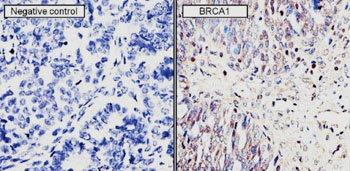Gene Testing Simplified for Women with Ovarian Cancer
By LabMedica International staff writers
Posted on 04 Aug 2016
A new streamlined approach to genetic testing for women with ovarian cancer provides testing rapidly and affordably, allowing many more patients to benefit from personalized cancer management and their relatives to benefit from cancer prevention strategies.Posted on 04 Aug 2016
Advances in DNA sequencing have made genetic testing fast and affordable, but limitations of testing processes are impeding realization of patient benefits and ovarian cancer exemplifies the potential value of genetic testing and the shortcomings of current pathways to access testing.

Image: An immunohistochemistry analysis of BRCA1 performed on normal tissue and human ovary carcinoma tissue (Photo courtesy of the CDC).
A team of scientists led by those at The Institute of Cancer Research (London, UK) developed a rapid, robust, mainstream genetic testing pathway in which testing is undertaken by the trained cancer team with cascade testing to relatives performed by the genetics team. The study participants were 207 women with ovarian cancer seen between July 2013 and November 2014 who met the eligibility criteria. In May 2014, the age limit was removed and the testing eligibility became, and remains, any woman with non-mucinous ovarian cancer.
BReast CAncer susceptibility gene (BRCA) testing was performed by one of two methods: Sanger sequencing and Multiplex ligation-dependent probe (MLPA) for 127 tests before March 24, 2014, the TruSight Cancer Panel (TSCP) for 80 tests afterwards, both within the TGLclinical gene testing laboratory (Translational Genomics Laboratory, Sutton, UK). For both methods, pathogenic mutations were independently verified using a second aliquot of DNA by Sanger sequencing or amplification MLPA, as appropriate. All predictive tests in relatives were also performed by Sanger or MLPA. All mutation-positive relatives had the same mutation that had been identified in the proband.
The new testing pathway reduced hospital visits for patients and substantially reduced the time taken for testing to be completed, ensuring the results were able to be incorporated into clinical decision making. The test results were useful in deciding medical management of four-fifths of the patients who were receiving cancer treatment. This included 32 women found to have a BRCA mutation, many of whom became eligible for new precision medicines only suitable for women with BRCA-related ovarian cancer.
Nazneen Rahman, MD, PhD, a professor and study leader said, “We know BRCA gene testing can be greatly beneficial for women with ovarian cancer, allowing their care to be tailored to their individual genetic information, and improving the cancer risk information we can provide to their families. Our new gene testing pathway is faster, simpler and better designed for cancer patients' needs than the standard National Health Service (NHS) process. Our study has shown that it is not only a feasible way of providing BRCA testing to all eligible women with ovarian cancer, but could also prevent cancers and save the NHS millions of pounds a year.” The study was published on July 13, 2016, in the journal Scientific Reports.
Related Links:
The Institute of Cancer Research
Translational Genomics Laboratory













